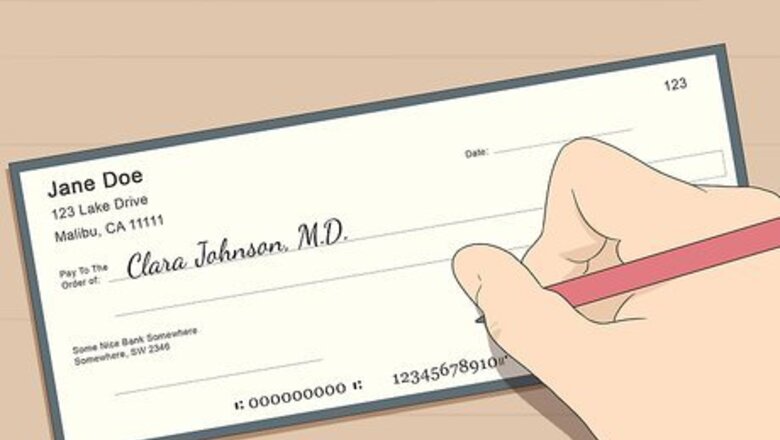
views
Writing Addresses or Invitations
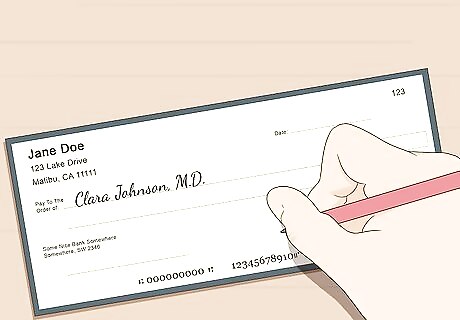
Use “M.D.” when you contact a doctor regarding something medical. Depending on your regular routine, you may be filling out forms, checks, or other official documents that you send to your doctor. Write out their first name and surname, then add an “M.D.” suffix at the end, which notes the formal nature of whatever you’re filling out. When writing something official, only use “M.D.” to address your doctor, and not the “Dr.” prefix. For instance, if you were filling out a check, you’d make it out to Clara Johnson, M.D.
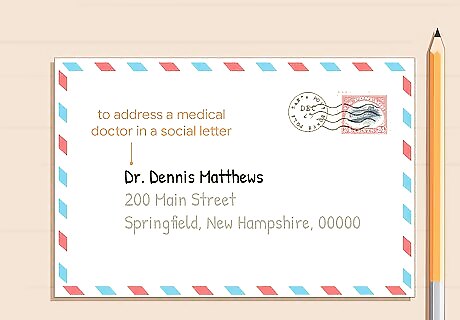
Choose “Dr.” when addressing a medical doctor in a social letter. Don’t worry about using both “M.D.” and “Dr.” in social letters, as this is a bit overkill. Instead, address the letter to “Dr.,” then the person’s first name and surname. Complete the rest of the address as you usually would, then you’ll be ready to send out the letter! For example, if you’re filling out a wedding invitation, you can address it to:Dr. Dennis Matthews200 Main StreetSpringfield, New Hampshire, 00000
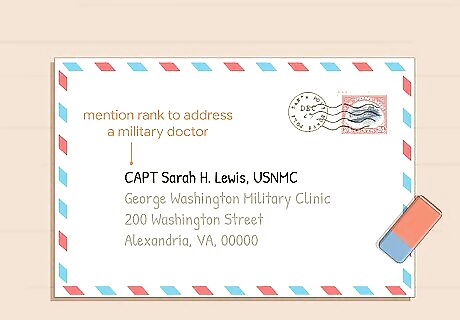
Include the person’s rank and branch when writing to a military doctor. Think about the specific officer you’re writing to, and what branch of the military they currently serve as doctor in. For official correspondence, figure out which hospital or clinic they’re working at. In the letter header, simply use the individual’s military rank and last name to start off your message. For instance, you may address a letter like this:CAPT Sarah H. Lewis, USNMCGeorge Washington Military Clinic200 Washington StreetAlexandria, VA, 00000 If you’re starting out the letter, you can address it as: “Dear Captain Lewis.”
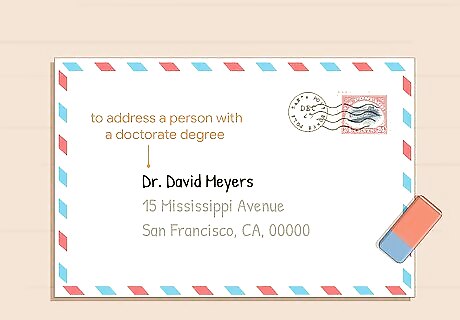
Use “Dr.” when writing to a person with a doctorate degree. If you’re writing a social letter, like a wedding invitation, you don’t need to use “PhD.” Draft the rest of the address like you usually would, using the person’s first and last name, along with their street, city, and zip code. For example, you can address a party invitation like this:Dr. David Meyers15 Mississippi AvenueSan Francisco, CA, 00000.
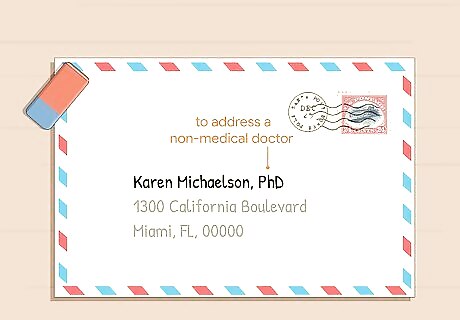
Opt for “PhD” when addressing a professional letter to a non-medical doctor. Think about the boilerplate of your letter before drafting it out. If you’re writing to a professor or other academic about a recommendation or other official. Use the recipient’s first name and surname, along with the “PhD” suffix on the address portion of the envelope. It’s also best to use this suffix in the letter header, as well. For instance, you may address a letter like this:Karen Michaelson, PhD1300 California BoulevardMiami, FL, 00000. As a letter header, write something like: “Dear Karen Michaelson, PhD,.”Tip: For something more casual, like an email, look at the doctor’s email signature to see what their preferred title is.
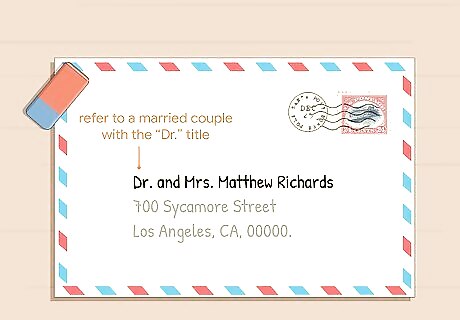
Refer to a married couple with the “Dr.” title. If you’re drafting an invitation or other letter that’s going to a person with a doctorate as well as their spouse, use the “Dr.” prefix and a separate honorific for the individual’s partner. Fill out the rest of the address block as you normally would before sending the letter. For example, you can address the letter like this:Dr. and Mrs. Matthew Richards700 Sycamore StreetLos Angeles, CA, 00000. If the wife has a doctorate and the husband does not, address the envelope like this: “Dr. Elizabeth and Mr. Ken Derwin.”
Speaking Conversationally

Use “Dr.” when speaking to a physician or someone with a doctorate. If you don’t know the individual well enough to call them by their first name, opt for their prefix and surname instead. Since you’re having a normal conversation, there’s no need to use “M.D.” or “PhD” when you address them. For instance, you can say something like: “Good evening Dr. Morgan! How is your night going?”

Address military doctor as “Dr.” You can address a military doctor in the same way that you’d speak to any other medical doctor. Use the “Dr.” prefix along with their surname whenever you speak to them in person. For instance, you may say something like: “Good morning Dr. Williams! Would I be able to talk with you about something?”

Opt for military rank if you don’t want to use “Dr.” While you can always use the “Dr.” prefix when speaking with a military doctor, you can always opt for something more efficient. Instead, use the individual’s military rank as a prefix when you speak to them. For example, you can say “Hello Lieutenant Clark!” instead of saying “Hello Dr. Clark!”



















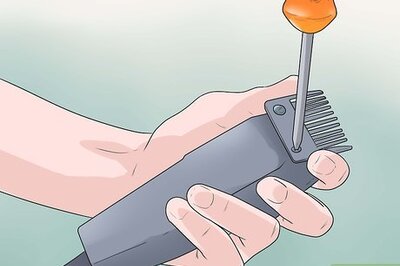
Comments
0 comment